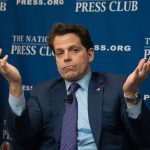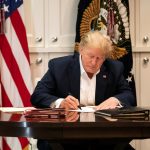Trump’s Tariffs Threaten Global Car Industry — Aston Martin and Others Sound the Alarm.
President Donald Trump’s sweeping import tariffs are already taking a devastating toll on global carmakers — and this may only be the beginning. Luxury car manufacturer Aston Martin has begun limiting vehicle imports to the U.S., a market that accounts for a third of its revenue, in response to Trump’s newly imposed 25% tariff on imported vehicles.
“We are currently limiting imports to the US while leveraging the stock held by our US dealers,” the British company said, as it braces for the fallout of Trump’s unpredictable trade policy.

The move reflects a broader unease gripping the automotive sector. On the same day, major manufacturers Stellantis and Mercedes-Benz withdrew their financial guidance for the year, citing the severe uncertainty created by the White House’s tariff strategy. Stellantis, whose brands include Jeep, Fiat, and Peugeot, said it could no longer forecast even a “moderate recovery” in 2025, while Mercedes warned of “considerable uncertainty for the world economy.”
This is not just corporate belt-tightening — it’s a warning siren. Global car shipments are falling. Production is slowing. Supply chains are fraying. And it’s everyday workers, from factory floors in Ohio to dealerships in Frankfurt, who will bear the cost of Trump’s economic brinkmanship.

The Trump administration claims the tariffs are designed to “bring auto production back to the U.S.” Yet, ironically, American manufacturers are among the hardest hit. Tariffs are driving up costs for domestic carmakers, who rely on imported parts, materials, and specialized technologies. Trump’s recent concession — to allow U.S. carmakers to apply for partial relief — is too little, too late. Markets are already rattled, plans scrapped, and billions in investments put on ice.
Mercedes bluntly stated that volatility around tariffs is now “too high to reliably assess” its future performance. The company, which assembles some vehicles in the U.S. but imports many from Europe, said its profits, margins, and cashflow are all under threat. The same story is playing out across the globe.
What we’re witnessing is the opening act of a self-inflicted economic wound — and it won’t stop with cars. Trump’s tariffs are destabilizing international relationships, discouraging investment, and imposing invisible taxes on consumers who will soon face higher prices and fewer choices.

Hope in Sensibility
Yet, there is still time to change course. History has shown that economic pragmatism can prevail over populist theatrics. Trump has already signaled a softening of some tariff terms — a small but telling shift. If public pressure, business backlash, and bipartisan concern continue to mount, there’s hope he will fully reconsider this destructive path. The global economy is interconnected, not a zero-sum game. With foresight and humility, even the most entrenched policies can be reversed before lasting damage is done.













